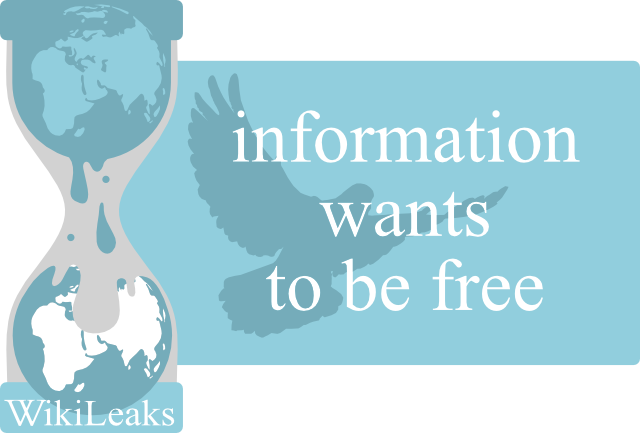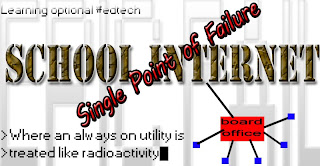 |
What you do when you try to privatize,
own or control digital content in the C21st |
When #ontsm considered how to introduce social media to students there was a lot of talk about walled gardens and safe places. By creating private digital spaces students could become used to the nuances of online life in a tidal pool before they wandered out into the ocean. It’s a nice idea. It’s predicated on a myth.
The flaw in this thinking is that privacy exists, that it ever existed. Anonymity is very difficult to maintain, it always has been. This isn’t a digital issue. A hundred years ago, people weren’t able to move about as easily as they do now. You tended to exist in a much more colloquial and static social group. Your town or village knew who you were because you were contextualized in it by your family, job, religion, culture and friends. Modern cities barely existed at that point. Industrialization and the machinery it produced gave us the ability to migrate individually in the 20th Century, but even that came with a lot of social baggage. If you were out alone on a motorcycle, you were socially classified, even if people didn’t know you personally. We do this all the time with race, socio-economic status, even accent; every time we stereotype we do it. Privacy has always been a myth. If anyone lays eyes on you who doesn’t know you, their impression of you is what you are socially. Digital information makes a greater mockery of that myth by spreading us across the web, ignoring our geography.
 Digital information is so fluid, so easy to create and share, that it is frictionless. You don’t have to physically share a book to share text any more, you don’t have to physically share a DVD to share a video any more. When information is a stream of data constantly flowing, ownership and privacy become impossible to manage in any traditional sense.
Digital information is so fluid, so easy to create and share, that it is frictionless. You don’t have to physically share a book to share text any more, you don’t have to physically share a DVD to share a video any more. When information is a stream of data constantly flowing, ownership and privacy become impossible to manage in any traditional sense.
If you put student data into a digital format, your ‘privacy settings’ (an ode to the myth to make you feel better) are set to whomever is the viewer of your content with the least goodwill toward you and the least respect for your privacy. This goes beyond the people you shared it with to anyone at all who can view your information. Any attempts to ‘lock down’ (another backward looking term designed to make you feel better) digital information is easily bypassed by a screen capture or a cut and paste.
The digital is leaking into the physical world too. If anyone sees or hears you doing anything, anywhere, at any time, and they have a smart phone on them, you are the push of a button away from being published. Stupidity has never been so readily documented; see youtube for a billion examples. If you think you’re ‘safe’ because you’re not doing something digitally, the ability to record and publish digitally makes your point moot. Want to go back to report cards on paper? It’s one photo away from being on Facebook. Think you’re in private because you’ve closed the door to your classroom? The kid videoing you without your knowing will have you on youtube in thirty seconds, and then copies of copies of copies spread across the web.
The idea of privacy might be a byproduct of industrialization – that machines can insulate us from our social context and offer us a kind of freedom people have never really had before. We leapt into digital machines thinking they would further isolate us from each other and preserve the myth of privacy, but the slippery nature of digital information makes a mockery of the myths of privacy and ownership of information.
When you can propagate information this easily and quickly, and exponentially like a virus, who owns it? When we stumbleupon material intentionally author intent quickly becomes a secondary influence in media. The viral nature of social media sharing pushes information in a way that used to be the job of publication. It’s hard to even introduce traditional publishing into this environment. This is such a chaotic, crowdsourced, place, the idea of a professional publisher (itself based on an industrialized limitation around the costs of printing to paper) becomes almost impossible to justify. Editors give way to crowd wisdom and the results are often indistinguishable. An argument might be made for professional publishing, but if crowd sourced material finds ways to approach the quality of traditional media, and ends up forcing it out of the market, what is left for the professional publisher?
Does the author’s intended audience matter? That information takes on a life of its own. Its audience is dictated by its accessibility and how effectively it hooks a viewer’s attention. In a medium where people are buried in information, caprice replaces intent, information that captures curiosity is gold.
The shear volume of data in this wild-west is so overwhelming that it couldn’t possibly be managed by traditional (industrially designed, limited paper media driven) editorial systems. Machines can try to self organize the data they present, and they are getting better and better at it, but crowd sourcing offers a way to keep a human touch in information flow. It lacks the clarity of purpose of professional editorial work, but given enough time it often produces surprisingly similar results. In fact, it often bypasses the political spin and self interest that traditional hierarchies have always put on the limited industrially defined information they claimed ownership over. Democratization of information means it becomes free from manipulation by the former gatekeepers of it.
If you’re making content in this brave new world, don’t expect to own or even direct it, once it’s out, it may end up in unexpected places. If you’re not making content, don’t worry, everyone one around you is, and it will end up where you don’t want it as well. How do companies and individuals survive in this madness? No one is really sure (I have a guess), but one thing is sure, it won’t be boring.
FOLLOW UP:
I was listening to CBC’s The Current today as they had Jared Cohen, the head of Google Ideas on talking about what is about to happen to the world. Two billion people are online, another five billion are about to join them. We’ve already seen the internet bypass governments and ferment revolution in the Middle East, and we’ve seen Western governments struggling with trying to keep control of information with wikileaks and other hactivism. If you have a few minutes, listen to Cohen on The Current. His ideas about where the world is going are radically transformative. The only part I’d question is his assertion that Google is a force of nature in this process, rather than just the most successful parasite.





